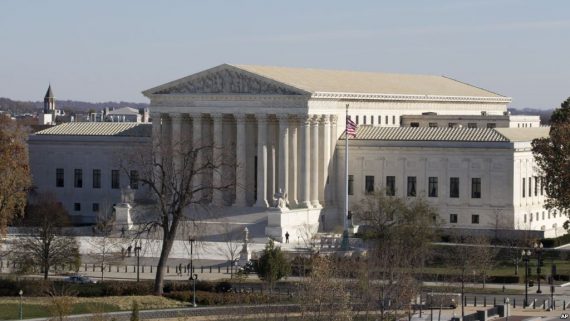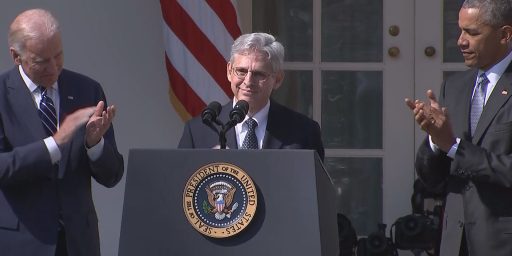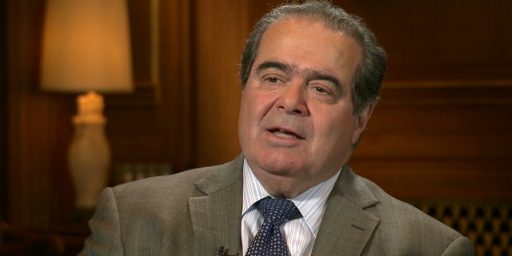The GOP’s Supreme Court Gamble Pays Off
Just under a year ago, Senate Republicans took a big risk regarding the Supreme Court. Now, it's paid off big time.
When the 114th Congress officially came to an end at Noon yesterday, we also came to the end of a political stand-off that lasted the better part of a year over the Supreme Court. It began just under a year ago when Supreme Court Justice Antonin Scalia passed away unexpectedly leaving the Supreme Court with eight members and an ideological divide that caused a handful of the cases argued in the October 2014 Term to end in 4-4 ties that resulted in letting the decision below stand without establishing any kind of national precedent. Almost immediately after Scalia’s passing, Republicans in the Senate and around the country lined up behind the idea of blocking any Supreme Court nominee until after the Presidential election. At the time, it seemed like a risky political move on the part of the Senate GOP for several reasons. First of all, it would be a rather public example of the kind of gridlock that poll after poll has shown the public to be largely opposed to, and given that it was a move that the GOP would have to remain consistent on through the election and there were some analysts who believed this would ultimately hurt the party at the polls. Additionally, Republicans were taking a huge political risk that could either pay off if a Republican won the White House and the GOP maintained control of the Senate, a prospect that seemed unlikely in the early part of 2016 when it was becoming apparent that Donald Trump would win the GOP nomination and that polling showed him losing to Hillary Clinton, or backfire in the worst of all possible outcomes. The GOP was also risking that a newly elected Hillary Clinton in the White House would appoint someone to the left of Merrick Garland, the center-left Chief Judge of the Court of Appeals for the District of Columbia Circuit that President Obama appointed to fill Antonin Scalia’s seat. Finally, for the plan the entirety of the Republican caucus needed to stick together for the better part of a year. While the GOP has been relatively good at keeping united, there was at least some speculation that the pressures of an election year, especially on Senators in states deemed to be at risk in 2016 such as Illinois, Wisconsin, Ohio, Pennsylvania, Florida, and New Hampshire.
As it turned out, the gamble paid off. Not only did Republicans win the White House, they managed to hold on to the Senate with a loss of only two seats, in Illinois and New Hampshire, meaning that they should easily be able to confirm whomever President-Elect Trump chooses to fill the seat left vacant by the late Justice Scalia nearly a year ago. SCOTUSBlog’s Amy Howe takes note of all this, and then turns to the future direction of the Court:
Nearly 300 days ago, on a sunny March morning, President Barack Obama nominated Merrick Garland, the chief judge of the U.S. Court of Appeals for the D.C. Circuit, to fill the vacancy created by the death of Justice Antonin Scalia. That nomination officially expired today at noon, when the 114th Congress came to a close.
Obama could have nominated Garland again as a matter of principle, or he conceivably could have attempted to install him without the Senate’s consent during the recent congressional recess. Instead, the president took the less controversial path of letting the nomination expire. Garland now resumes his duties on the court of appeals.
(…)
The Republicans’ strategy was controversial but ultimately successful. Although Obama might have hoped that Garland’s sterling qualifications and his reputation as an ideological moderate would leave Senate Republicans with no choice but to confirm him, Republicans held their ground, refusing even to hold hearings on the Garland nomination. And the strategy paid off: Now President-elect Donald Trump will nominate a replacement for Scalia instead. During the campaign, Trump released two lists of potential nominees to the Supreme Court, and he has promised to choose a nominee from those lists to succeed Scalia.
The potential nominees on Trump’s lists are all solidly conservative, significantly more so than Garland. The consequences of the resulting ideological shift on the Supreme Court are likely to be felt in U.S. law for decades.
I actually disagree with Howe on her last point here. Whomever Trump appoints is unlikely to cause the Supreme Court’s ideological balance to change significantly from where it stood before Justice Scalia died. At that point, we had four Justices who rather routinely could be counted on to stay more or less together on the ‘conservative’ side (Roberts, Alito, Scalia, and Thomas), and four who could be counted on to stick more or less together on the ‘liberal’ side (Ginsburg, Breyer, Sotomayor, and Kagan). In the middle, usually, there would be Justice Anthony Kennedy, the final Supreme Court nominee submitted by President Reagan during his time in office and, as I’ve noted before, a man whose presence on the Court is due solely to the Democrats’ successful effort to block the nomination of Robert Bork in 1987. While there were often times when the outcome of particular cases would defy prediction and you’d see conservative and liberal Justices on the same side of particular issues in particular cases, when it came to even some high-profile cases, in the most controversial cases it was almost always Kennedy who would be the deciding vote and, quite often, the author of the majority opinion. This has been especially true on issues such as LGBT rights such as the marriage equality cases that the Court dealt with in 2013 and 2015, as well as issues such as abortion and affirmative action. A Republican replacing one of the core conservatives with another conservative Judge, or a Democrat replacing someone from the liberal side, then, would not really have an impact on the ideological balance on the Court in the short-term.
That isn’t to say that Trump’s appointment will have no impact at all. For one thing, each Justice is an individual rather than just a peg that easily fits in an ideological whole. While Justice Scalia was generally a conservative, there were plenty of times when he took positions that, to outside observers, seemed at odds with his supposed political ideology. Early in his tenure on the Supreme Court, for example, Scalia joined liberal stalwarts such as William Brennan and Thurgood Marshall in a ruling that declared that laws banning the burning of the American Flag violated the First Amendment. When asked about that ruling in particular over the years, Scalia would often say that if he were King he would outlaw flag burning but that the First Amendment compelled him to reach the conclusion that it was protected free speech, a conclusion that fellow conservatives who were on the Court at the time, such as the late Chief Justice William Rehnquist and Justice Sandra Day O’Connor, most emphatically disagreed with. Other Justices who have been on the Court for a long time will have similar examples in their own history of times when they voted in a manner that defied expectations, including whoever Trump appoints. Additionally, given that the makeup of the Court is so small it’s inevitable that each new Justice has at least some impact on their fellow Justices, something that has been talked about in many books about the Court, including Jeffrey Toobin’s The Nine: Inside the Secret World of the Supreme Court. Finally, it’s unlikely that whoever Trump appoints will have the same long-term influence on American law that Justice Scalia is likely to have. As even Scalia’s critics have admitted for years, Scalia’s opinions and dissents will likely be studied by law students, legal scholars, law professors, attorneys, and Judges for a long time to come and his legacy is likely to be similar to that left behind by Justices such as Oliver Wendell Holmes Jr., Louis Brandies, William Brennan, and others who have become the stars of American jurisprudence.
Beyond this, though, Trump’s first appointment, which could come before he takes office or shortly thereafter so that confirmation can take place fast enough for the new Justice to take part in the final arguments of the Court’s current term, is unlikely to have a serious impact on the direction the Court was moving before Justice Scalia died. Instead, the opportunity for real change will come if and when President Trump gets the opportunity to appoint another Justice in the next four to eight years. In all likelihood, there will be at least one more vacancy some time in the next four years, and there certainly would be one or more some time in the next eight years should Trump win re-election in 2020. The most likely candidates for that vacancy at this point are Justices Breyer, Ginsburg, and Kennedy, all of whom are over 70 years old at this point, with two of them (Ginsburg and Kennedy) already above 80. Replacing either Ginsburg or Breyer, of course, would mean that the Court’s liberal wing would be reduced to three members. Replacing Kennedy would mean that the ‘swing’ vote on the Court would presumably be far more reliably conservative. Either way, this will likely influence the direction of the Court for several decades at least. Either event will be a signiicant threshold in the development of Constitutional law in the future.






Strategically, this makes them equivalent to a Jeopardy contestant who comes from behind to win by wagering their entire scoreboard in the final round. It’s a bad strategy, but when it happens to succeed it pays off big.
Is it too much to hope that Roberts will become more liberal with age?
A pity, really. This is only going to encourage more of this sort of thing. I look forward to the GOP, circa 2019, suddenly screaming themselves hoarse about the Democrats filibustering nominees until the next election.
Sure…the gamble paid off.
The Republic will be the worse for it.
Dark days indeed….
Another example of Scalia’s apparent unorthodoxy was his dissent (joined by Stevens) in Hamdi, in which he argued that U.S. Citizens could not be denied Constitutional rights to a criminal trial merely based upon the accusation that they are enemy combatants. He also dissented in a case in which the SCOTUS held that the feds could collect DNA without a warrant: “the proud men who wrote the charter of our liberties would not have been so eager to open their mouths for royal inspection.”
My impression is that Garland, would have voted similar to Breyer (and opposite Scalia) in those cases. He strikes me as a New Deal style liberal jurist, highly deferential to the needs of executive power. We could probably do worse than Scalia right now, and probably will.
@Hal_10000:
I don’t, actually.
Of course, there would be some schadenfreude in that particular gander getting the same sauce it dumped on the goose, but it was wrong for the Republicans to do it and it would be equally wrong for the Democrats.
But you’re right, sadly. It will encourage more of this kind of garbage, and American politics will continue spiraling down the crap-hole the Republicans have spent the past eight years digging.
@Kylopod:
Was it really a bad strategy? Perhaps the Republicans who supported blocking the nomination had a better idea of the consequences than the people who thought it would cause an anti-Republican backlash with voters.
Isn’t Howe’s point that, under the previous norms both sides went along with, the court should have swung drastically to the Left, but that this norm-shattering gambit by the GOP resulted in that not happening?
Previously both parties accepted that drastic shifts in the ideological make-up of the court were mostly left up to chance (unplanned vacancies), and a party could be waiting around a generation+ for it to be their turn to have said chance to reshape the court. Having that once in a generation chance snatched away, after it had been patiently waited for and had finally arrived, amounts to an enormous theft of power from the current president’s voting coalition. I personally can’t even imagine any form of norm-upsetting obstruction the Democrats could now engage in, even over the long term, that would balance out against that staggering loss.
@Hal_10000:
I don’t think we’ll have to wait until 2019. The GOP’s reasoning for blocking Garland was that there was an election going on, and the American people’s voices needed a say in this process. The next election season for the Senate starts in about 6 months, so…
Refusing to confirm, or even consider, Garland doesn’t strike me as much of a risk for McConnell and his ilk. You point out two problems, first that the public might hold them accountable for gridlock and second that if, as seemed likely, Clinton were elected they’d end up with a more liberal justice.
By the time Garland came up McConnell had been obstructing for seven years with no sign the electorate would hold him and the Rs responsible, or even be aware of the situation. An opinion confirmed by the electorate subsequently choosing (more or less) to elect an R to punish the Ds for the gridlock.
As to the second, McConnell wouldn’t face election for another four years.And in any case, he wouldn’t be held individually accountable. In fact he’d get credit for doing his best to halt Garland.
This is a collective action problem. The interests of a hypothetical “the Republicans” or “Conservatives” weigh little in the calculations of individual Republicans wanting only to protect themselves against a primary challenge.
Good article at VOX a couple days ago about McConnell being about nothing but McConnell.
It should have been a risky move, and would have been if Democrats had even a modicum of fighting spirit.
@gVOR08:
Right, whatever the reason – be it gerrymandering producing more rabidly partisan districts or a generally increasing rural/urban and heartland/coast divide – those on the right have become less willing to compromise. As we all saw from the rise of the Tea Party, Republican rank and file voters reward obstruction and punish compromise. McConnell is nothing if not a smart politician with great instincts, if no core values. He could feel the way the wind was blowing and he knows voter attitudes well. I would love someone like him on the D side as well.
We all remember this article: http://www.theatlantic.com/magazine/archive/2016/07/how-american-politics-went-insane/485570/
Politics is a blood sport now. There can be no compromise, and the penalties for losing elections and being out of power are more dire than ever. I fully expect the winners in the future to go on using the power of the office to suppress their political opponents, akin to what has happened in Russia and what is happening in Turkey now.
It’s rule or die, baby!
@Ratufa: It was a bad strategy because if Hillary had won, she’d probably have appointed a more liberal justice than Garland. So it was high risk, high reward–which isn’t intrinsically a bad strategy in all circumstances, but which is practically the GOP’s defining mode of operation, and has generally hurt them more than it has helped.
@Neil Hudelson:
Right on cue…
http://talkingpointsmemo.com/livewire/schumer-trump-supreme-court-nominee-opposition
@Franklin: nah, with age comes wisdom! aside from the leftwing hags on the bench i mean…….but who ever expected them to vote any way but wrong?
It is expected that one or more of the more liberal jurists will depart for the Great Court In The Sky. Had Garland been confirmed, the court would have shifted to the left, and then shifted back to the middle when Trump nominates a replacement for Ginsburg or Kennedy.
There will be a major change. Civil rights are going to be undermined. Corporate rights will be maximized.
If it makes you feel any better, I am an upper middle class white guy so I’ll be fine. (Not sure why that would make you feel better, but it makes me feel better)
@Neil Hudelson: So, the 2018 Senate elections will be a red-state referendum on whether the GOP should have a filibuster-proof majority?
@PD Shaw:
Maybe, but SCOTUS seats didn’t seem to be too big of a motivation this time around for either side. 2018 could also be a referendum on POTUS’s performance. Or a referendum on the state of the economy. Many referenda are possible, really. I don’t think any of us can predict what the political game will look like after Trump gets done making America all sorts of great.
But to your point, to be fillibuster-proof, the GOP would have to pick up 8 seats. Looking at the map of whose up for re-election, the competitive Democratic states are:
-Florida
-Indiana
-Maine*
-Missouri
-Montana
-West Virginia
-Virginia
The rest of the states just don’t seem all that competitive (but I’m happy to be be shown how I’m wrong).
So if the GOP runs the table and doesn’t lose a single one of their seats (like Nevada), then they still come up short.
In other words, its almost as big of a gamble as the one McConnell took.
(I should note that I’m not actually in favor of this tactic, but the GOP would have no one to blame but themselves if Schumer went this route.)
*Technically not Democratic, and Angus King is going to a wild card regardless.
@bill:
Middle School is a cool place to be, right Bill?
@bill:
Well, yeah…wrong from the point of view of an imbecilic bigot.
I mean…if you think religious freedom means the right to impose your religion on others…then sure…they vote wrong.
If you think that the only possible form of corruption is the direct exchange of cash…then sure…they vote wrong.
But if you have half a brain…oh, wait…never mind…
@Neil Hudelson: As far as red states, I think you would have to include Ohio, Pennsylvania, Wisconsin and Michigan, states that voted for Trump that would be called on to evaluate whether Trump’s nominee should be blocked. I’m not making any predictions here other, than I don’t think Schumer will have the support of enough Senators to block a nomination.
I think the gambit worked because the GOP has a constituency that loathed Trump, but came out to vote for him because they valued SCOTUS appointments over all. I don’t think the Dems have that dynamic. The GOP got more votes than they lost from the gambit; its probable that the Dems would simply lose votes.
@Kylopod:
Right now, the GOP controls the House, the Senate, and the Presidency. They are doing quite well in races for state government, as well:
http://www.dailykos.com/story/2016/11/14/1598918/-Republicans-now-dominate-state-government-with-32-legislatures-and-33-governors
Sure, they’ve lost ground in some places, California being a standout example, and their current strategy may not to work in the long-term, because of changing demographics and other factors. But, they’re now in a position to change the makeup of the Supreme Court for decades, and put in place policies, such as tax cuts, more lenient rules for corporations, etc, that will be difficult for a future Democratic administration to change. They are also in a good position to make more changes in state voting procedures to favor Republican demographics. In the short-term, this may be the best that Republicans could have hoped for, assuming that Trump doesn’t do anything too crazy wrt deviating from GOP policy.
@Neil Hudelson: I’m not sure Virginia is really competitive anymore. At this point the state seems firmly blue: all the offices with statewide vote (Governor, Lt. Gov, Attorney General, both US Senators) are held by Democrats and the state senate is only Republican by one seat (20-19). And Virginia stayed blue on Nov 8 even as surrounding states went red.
Both Warner and Kaine are popular former-governors-now-senators, probably not vulnerable at this point anyway. I can’t think of any Republican figure in Virginia who could unseat either of them.
@Mikey: @PD Shaw:
GOP base has many single issue voters who feel very strongly about those single issues. It’s easy to satisfy them – be pro gun, anti abortion and have a pulse. That is enough to get you to 40% in most places. Don’t sleep on rural Virginia. Gillespie came close to unseating Warner (!) by clawing into Warner’s former strength in SW Virginia. Those rural Tea Party voters are darn passionate about what they want.
@PD Shaw:
I thought that future composition of the Supreme Court was THE reason to vote for anybody but a Republican – obviously that did not resonate with working Democratic constituencies much at all.
Hey…check this out…another small government Republican who wants the government to be in charge of women…
I would hate to be a Republican man and have to explain to my daughter why I voted for Trump.
@Rick Zhang: Warner’s close call was a surprise considering how popular and highly-regarded he’d been as governor (approval ratings approaching 80% in some polls).
But he’s not running again until 2020, the 2018 guy is Tim Kaine, who squashed George Allen in 2012. But he’ll probably face some stiffer competition this time around.
@al-Alameda:
Bill comes off as a “no girls talked to me and I got beaten up a lot” kind of middle school guy – but he has retained his 13 year old’s outlook on the world…
@Ratufa:
Spot-on.
Republican are going to fwck up this nation for decades.
You think Iraq and the Bush Contraction were bad?
Just wait and see what is next.
Dark days…unless you are an incredibly rich white guy.
The Republicans decided, back in 2009, that they would not attempt to be a governing party, merely an opposition party. This was just one part of that. Part and parcel with filibustering everything, and spending their days and nights voting to repeal Obamacare when they knew it would be vetoed or fail in the senate.
It’s not something that works well for the country, but I don’t think it matters to most of them. With the exception of a small percentage of Trump’s supporters, they aren’t Nazis, they are Nihilists.
Now, they must govern. Good luck with that.
I didn’t vote for this shit show and I don’t want this shit show, but I sure want to watch this shit show. It’s going to be equal parts awesome and awful.
Doug in 2020:
GOP’s Coup d’Etat Strategy Pays Off
All’s fair in love and politics, right Doug?
@James Pearce:
The instant Democrats fight, they’re smacked down by the media.
Howard Dean was disqualified for a scream. Hillary Clinton for emails. Biden is a “gaffe machine.” Kerry was lamblasted for being a hoity-toity rich wavesurfer.
Trump? A populist. Bush II? A good ole boy Texan.
Yeah … not acting on Supreme Court nominations while waiting on a Presidential election, not acting on a hundred nominations for lower courts, forcing budget sequestrations as the only alternative to shutdown, voting en bloc as a party to oppose every single proposal of the President ,,, All for The Good, isn’t it? Yes indeedy, the Republicans have certainly been entrepreneurs in recent American politics and have established the legitimacy of many bold new practices which would probably imbued the Founding Fathers with ….
Tears and nausea, I suspect But maybe it’ll look better in the history books. A hundred yeas from now, perhaps historians will devote a few paragraphs to Mitch McConnell and his crew when discussing the political evolution of the American republic And a thousand years hence … maybe they’ll be found to merit whole chapters in such tomes, or even their own volumes.
Hasn’t paid off yet. The GOP talked of four years of SCOTUS filibusters when they thought Clinton would win, no reason the Democrats can’t return the favor.
Seriously, I don’t think most people would care any more than they did with the GOP refusing to consider Garland. It doesn’t come up on most people’s radar; too busy making ends meet, taking the kids to sports, working and living to pay attention to that sort of thing.
People who follow politics care about this sort of thing. They’re in the minority. Most people couldn’t name a single person on the court, or even tell you how many are on it. Makes it hard to care if appointments are being stalled.
The latest from Mitch today:
Doesn’t seem to be a new standard to me; wasn’t that what you guys said some months ago? Additionally, Schumer’s actual quote was
which seems to be the traditional standard for SCOTUS nominees. If Trump wants his nominees approved, all he needs to do is pick credible jurists. Somehow, I expect that picks from the Heritage Foundation or the brain trust at
Neo-Nazi CentralBreitbart (sorry I forgot the name for a second) probably will be easy to discredit.@C. Clavin: Someone had better explain the facts of biology to that idiot.